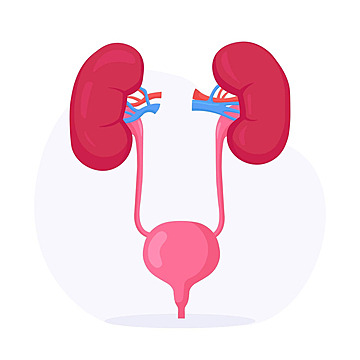As specialists in the urinary tract and male reproductive system, urologists diagnose and treat a wide range of conditions. Their expertise encompasses both medical and surgical interventions, addressing issues that can affect patients of all ages.
Here are some of the most common conditions urologists treat:
1. Urinary Tract Infections (UTIs)
Urinary tract infections are infections that can occur in any part of the urinary system, including the kidneys, bladder, ureters, and urethra. UTIs are more common in women but can also affect men and children. Symptoms often include frequent urination, a burning sensation during urination, and cloudy or strong-smelling urine. Urologists typically treat UTIs with antibiotics and may investigate underlying causes in recurrent cases.
2. Kidney Stones
Kidney stones are hard deposits of minerals and salts that form in the kidneys. They can cause severe pain, nausea, and difficulty urinating if they move into the ureters. Treatment may involve pain management, medications to facilitate stone passage, and procedures such as extracorporeal shock wave lithotripsy (ESWL) or surgical removal for larger stones.
3. Benign Prostatic Hyperplasia (BPH)
BPH is the non-cancerous enlargement of the prostate gland, common in older men. It can lead to urinary symptoms such as frequent urination, weak stream, and difficulty starting urination. Urologists manage BPH with medications, minimally invasive procedures like transurethral resection of the prostate (TURP), or laser therapy.
4. Prostate Cancer
Prostate cancer is one of the most common cancers among men. Urologists play a crucial role in diagnosing, staging, and treating prostate cancer. Treatment options include active surveillance, surgery (prostatectomy), radiation therapy, hormone therapy, and chemotherapy, depending on the stage and aggressiveness of the cancer.
5. Erectile Dysfunction (ED)
Erectile dysfunction is the inability to achieve or maintain an erection sufficient for sexual intercourse. It can result from physical conditions like diabetes and heart disease, psychological factors, or a combination of both. Urologists offer various treatments, including oral medications (PDE5 inhibitors), penile injections, vacuum erection devices, and surgical implants.
6. Incontinence
Urinary incontinence, or the loss of bladder control, can significantly impact quality of life. There are several types, including stress incontinence, urge incontinence, and overflow incontinence. Treatment strategies range from lifestyle modifications and pelvic floor exercises to medications and surgical interventions, such as sling procedures or artificial urinary sphincters.
7. Interstitial Cystitis (Painful Bladder Syndrome)
Interstitial cystitis is a chronic condition characterized by bladder pain and frequent, urgent urination. The exact cause is unknown, making it challenging to treat. Urologists manage this condition with dietary modifications, bladder instillations, oral medications, physical therapy, and in some cases, surgery.
8. Overactive Bladder
Overactive bladder is a condition marked by sudden, involuntary contractions of the bladder muscles, leading to frequent urination and urgency. Treatments include behavioral therapies, medications, nerve stimulation therapies, and Botox injections.
9. Male Infertility
Urologists address male infertility issues, which can result from various factors, including hormonal imbalances, varicocele, and obstructive azoospermia. Treatments range from lifestyle changes and medications to surgical interventions, such as varicocele repair and sperm retrieval techniques.
10. Testicular Conditions
Conditions affecting the testicles, such as testicular torsion, epididymitis, and testicular cancer, require prompt evaluation and treatment. Urologists provide both medical and surgical management for these conditions, which can include antibiotics, pain management, and surgical correction or removal of affected tissues.
11. Bladder and Kidney Cancer
Urologists diagnose and treat cancers of the bladder and kidneys. Treatment options vary based on the cancer's stage and may include surgery (such as cystectomy or nephrectomy), chemotherapy, radiation therapy, immunotherapy, and targeted therapy.
12. Pediatric Urology
Urologists also treat children with conditions like vesicoureteral reflux, hypospadias, and undescended testicles. Pediatric urology involves a combination of medical management and surgical correction to ensure proper urinary and reproductive development.
Conclusion
Urologists are vital healthcare providers who address a wide array of conditions affecting the urinary and male reproductive systems. Their comprehensive approach to diagnosis and treatment helps improve patients' quality of life and overall health, making their role essential in both preventive care and the management of complex urological disorders.





Comments